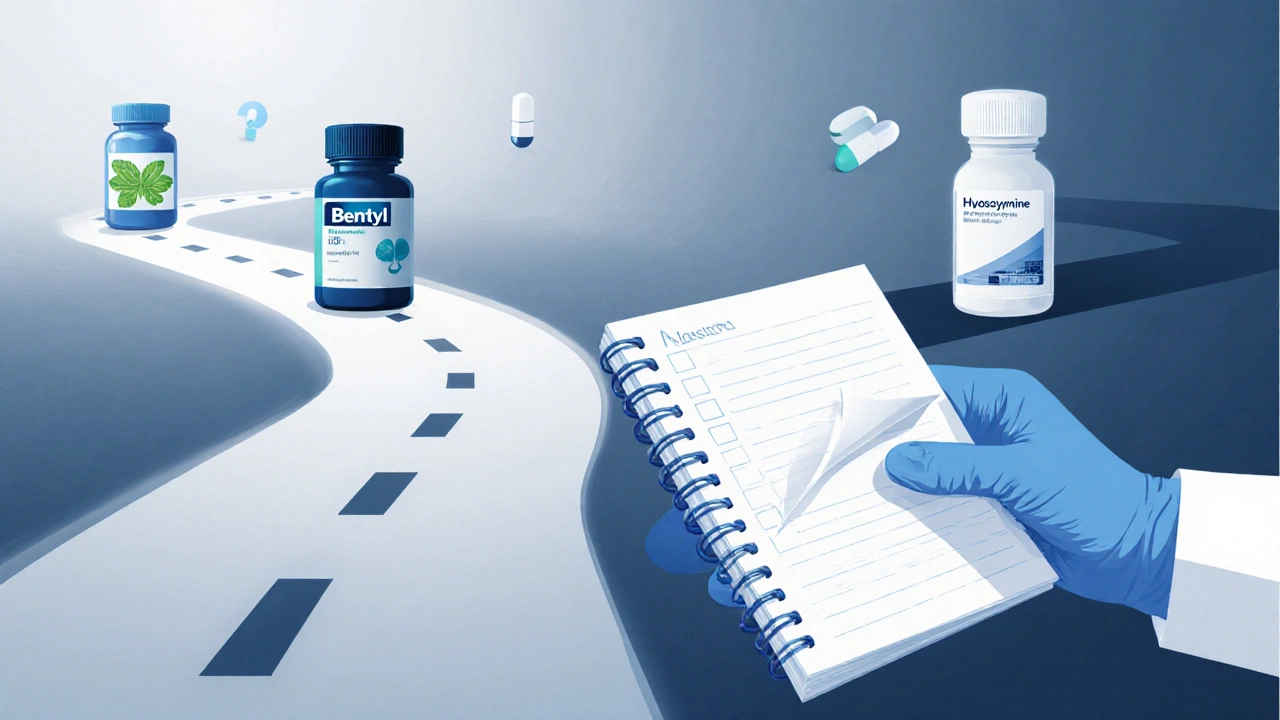IBS Medication Comparison Tool
Recommended Medication
Enter your symptoms and tolerance level, then click Compare Medications to see personalized recommendations.
Detailed Comparison
| Medication | Mechanism | Best For | Side Effects |
|---|
People with irritable bowel syndrome (IBS) often wonder whether the prescription drug Bentyl is the right choice or if another option would work better. This article breaks down how Bentyl works, its pros and cons, and how it stacks up against the most common alternatives such as hyoscyamine, peppermint oil, alosetron, and mebeverine.
What is Bentyl (Dicyclomine)?
Bentyl is the brand name for dicyclomine, an anticholinergic medication that relaxes smooth muscle in the gut. It was first approved by the FDA in the early 1970s and has since become a go‑to drug for relieving abdominal cramping associated with IBS.
How Bentyl Works
Dicyclomine blocks acetylcholine receptors on intestinal smooth muscle, reducing spasms and the pain that follows. Because it targets the parasympathetic nervous system, the drug also slows bowel motility a bit, which can help people who experience frequent, urgent trips to the bathroom.
Typical Dosage and Onset
- Initial dose: 20mg taken orally 3-4 times daily.
- Usual maintenance: 40mg three times a day, though some patients stay on 20mg if side‑effects appear.
- Onset of relief: 30-60minutes after ingestion.
Pros of Bentyl
When it works, Bentyl offers fast relief of cramping, is widely available in generic form, and does not require any special dietary restrictions. Many users report noticeable symptom reduction within the first week of treatment.
Cons and Common Side‑Effects
The anticholinergic action also means users can experience dry mouth, blurry vision, constipation, or urinary retention. Because it slows gut movement, some patients feel overly sluggish after a few doses. In rare cases, Bentyl can trigger an allergic reaction or exacerbate glaucoma.
Alternative IBS Medications
Below are the most frequently prescribed or recommended alternatives. Each one tackles IBS symptoms through a different mechanism.
Hyoscyamine
Hyoscyamine is a naturally derived anticholinergic that works similarly to dicyclomine but tends to act faster and is often used for short‑term flare‑ups. Typical dose ranges from 0.125mg to 0.5mg three times daily.
Peppermint Oil (Enteric‑Coated)
Peppermint oil is a botanical supplement that relaxes smooth muscle via calcium channel inhibition. The standard regimen is 0.2mL (about two capsules) taken 2-3 times per day before meals.
Alosetron
Alosetron is a serotonin‑2 receptor antagonist approved for severe diarrhea‑predominant IBS in women who have not responded to other treatments. Dosage is 0.5mg twice daily; it requires a risk‑evaluation and mitigation strategy (REMS) due to rare but serious constipation.
Mebeverine
Mebeverine is a spasmolytic that directly relaxes intestinal smooth muscle without anticholinergic side‑effects. In the U.S. it is available as a compounded prescription, typically 135mg three times a day.
Loperamide (Imodium)
Loperamide is an opioid‑receptor agonist that slows intestinal transit, making it useful for IBS‑C (constipation‑predominant) but less helpful for cramping. Standard dose is 2mg after the first loose stool, then 1mg after each subsequent stool, not exceeding 8mg per day.
Side‑Effect Profiles at a Glance
| Medication | Mechanism | Typical Dose | Onset | Key Side‑Effects |
|---|---|---|---|---|
| Bentyl | Anticholinergic (muscarinic blockade) | 20‑40mg 3‑4×/day | 30‑60min | Dry mouth, constipation, blurry vision |
| Hyoscyamine | Anticholinergic (natural alkaloid) | 0.125‑0.5mg 3×/day | 15‑30min | Dry mouth, tachycardia, urinary retention |
| Peppermint Oil | Calcium‑channel inhibition | 0.2mL enteric‑coated 2‑3×/day | 1‑2hrs | Heartburn, allergic reaction (rare) |
| Alosetron | 5‑HT₂ antagonist | 0.5mg 2×/day | 2‑3hrs | Severe constipation, ischemic colitis |
| Mebeverine | Direct smooth‑muscle relaxant | 135mg 3×/day | 45‑60min | Minimal; occasional nausea |
| Loperamide | Peripheral µ‑opioid agonist | 2‑8mg/day | 15‑30min | Constipation, abdominal cramps |
When to Choose Bentyl Over the Others
Bentyl shines for patients who need rapid cramp relief and can tolerate mild anticholinergic side‑effects. It’s especially useful when meals trigger spasms, because the drug peaks within an hour. If you have a history of glaucoma, urinary retention, or severe dry mouth, you might look to hyoscyamine or a non‑anticholinergic option like mebeverine.

Decision‑Making Checklist
- Primary symptom: cramping vs diarrhea vs constipation.
- Side‑effect tolerance: can you handle dry mouth or blurry vision?
- Pregnancy status: many of these drugs lack safety data.
- Cost & insurance: generic dicyclomine is usually cheapest.
- Doctor’s monitoring: alosetron requires REMS, loperamide needs dosage caps.
How to Talk to Your Provider
Bring a symptom diary that notes when pain starts, what you ate, and which over‑the‑counter remedies you’ve tried. Ask specific questions like, “Will Bentyl interact with my current antihistamine?” and “If I develop constipation, how quickly should I switch to another agent?” Your provider can then tailor the regimen, possibly starting with a low dose of Bentyl and adding a supplement such as peppermint oil for synergy.
Key Takeaways
- Bentyl (dicyclomine) provides fast antispasmodic relief but brings anticholinergic side‑effects.
- Hyoscyamine works faster but shares many of the same side‑effects.
- Peppermint oil offers a natural, low‑risk option, though onset is slower.
- Alosetron is reserved for severe, diarrhea‑dominant IBS in women under strict monitoring.
- Mebeverine is a non‑anticholinergic spasmolytic with minimal side‑effects, useful when anticholinergics are contraindicated.
Frequently Asked Questions
Can I take Bentyl with other IBS medications?
Yes, but timing matters. For example, you can combine Bentyl with peppermint oil if you wait 30minutes after the capsule to avoid overlapping anticholinergic effects. Always check with your pharmacist for drug‑drug interactions.
How long should I stay on Bentyl before evaluating effectiveness?
Give it at least one week at a stable dose. If you haven’t noticed a 30‑40% reduction in cramp frequency, discuss dosage adjustment or switching to an alternative.
Is Bentyl safe for older adults?
Caution is advised. Elderly patients are more prone to dry mouth, urinary retention, and confusion from anticholinergics. Starting at the lowest dose (20mg) and monitoring closely is essential.
What should I do if I develop severe constipation on Bentyl?
Contact your doctor right away. They may lower the dose, add a stool softener, or switch you to a non‑anticholinergic option like peppermint oil or mebeverine.
Can I use Bentyl during pregnancy?
Dicyclomine is classified as Category B, meaning animal studies show no risk but there are no well‑controlled human studies. Discuss risks and benefits with your obstetrician before starting.


When it comes to managing IBS, the American medical system finally offers a solution that cuts through the nonsense of foreign herbal quackery. Bentyl stands as a testament to the ingenuity of FDA‑approved pharmaceuticals that are backed by rigorous clinical trials. Unlike those flaky peppermint oils that promise miracles but deliver nothing but a hint of minty aftertaste, Bentyl delivers real, measurable relief. The anticholinergic action, though sometimes maligned, is precisely what you need to calm the spasms that keep American workers away from their desks. Patients who tolerate a little dry mouth are still far better off than those who waste money on over‑the‑counter supplements that have no FDA oversight. The side‑effect profile is transparent: dry mouth, constipation, and blurry vision, all of which are easy to monitor with a simple daily log. You can even pair Bentyl with a low‑dose fiber supplement to mitigate constipation, a strategy our doctors routinely recommend. The alternatives like hyoscyamine merely repackage the same anticholinergic mechanism with a fancier name and a higher price tag. Peppermint oil, while natural, suffers from variable absorption and often requires enteric coating that adds to the cost. Alosetron, reserved for a narrow subset of women, carries a black‑box warning that makes it unsuitable for the average American. Mebeverine is not even approved in the United States, forcing patients to seek compounding pharmacies that may deliver inconsistent dosages. Loperamide is simply an anti‑diarrheal and does nothing for the painful cramping that defines IBS. If you have the budget, start with Bentyl at the lowest effective dose and adjust upward only under physician supervision. Do not be fooled by the hype surrounding ‘natural’ treatments; they often lack the potency required for serious IBS sufferers. Remember, the United States has the most advanced drug approval pipeline, and Bentyl is a product of that excellence. In summary, choose Bentyl if you want fast, reliable relief and are willing to manage the modest anticholinergic side effects responsibly.
Hey folks, great rundown! Bentyl does the trick for quick cramp relief 😂. If you’re worried about dry mouth just sip water and maybe a sugar‑free gum 😛. It’s also cheap compared to the fancy specialty meds so your wallet stays happy. Remember to give it a week before deciding if it’s working.
The article provides a balanced overview of the pharmacologic options for IBS. It is helpful that the mechanisms of each drug are clearly described alongside typical dosing. For readers interested in non‑pharmacologic measures, adding a brief note about dietary fiber could further enhance the guide.
Don’t be fooled by the usual hype that Bentyl is just a harmless antispasmodic. Big pharma knows that the anticholinergic side‑effects keep patients dependent on over‑the‑counter remedies that they push through advertisements. They even fund the studies that downplay the risks of dry mouth and blurry vision. If you want real freedom, look into holistic protocols that aren’t tied to corporate drug pipelines.
Honestly, Bentyl isn’t the miracle some claim. The anticholinergic load can worsen constipation and even cause cognitive fog in some patients. I’d argue the article glosses over these downsides and over‑states the cost‑benefit. Consider trying peppermint oil first; the side‑effects are minimal and the evidence, while not as robust, is still solid.
Wow, this article really opened my eyes, there’s so much to consider, from dosage timing to side‑effect management, and I can’t wait to share this info with everyone!!!
Meh
It’s interesting to contemplate how the pursuit of symptom relief often mirrors a deeper quest for control over one’s internal landscape; perhaps the true remedy lies not only in pharmacology but also in mindfulness practices that acknowledge the gut‑brain axis 🌱.
Sure, Bentyl works, but if you think “anticholinergic” is some magic word, you’re missing the bigger picture – it’s just a blocker, and blockers can backfire 😅. Real solutions need holistic integration, not just a pill.
Guys, don’t forget to track your symptoms in a simple journal – it makes talking to your doc so much easier and you’ll see patterns faster! Keep it up!
Excellent summary, Raina! However, consider adding a comma after “non‑pharmacologic measures,” and perhaps a semicolon before “for readers interested.” Your clarity is appreciated!
Listen up everyone, the only reason US doctors push Bentyl is because it’s manufactured here and keeps the economy thriving :)!
Wow, what a revelation – a simple pill versus ‘holistic integration’? The drama of oversimplifying complex gut physiology for the sake of convenience is truly astonishing; I guess we’re all just waiting for the next sensational headline that promises cure‑all magic in a capsule!
Thanks for the thorough breakdown, everyone. I’ll stick with low‑dose Bentyl and monitor side effects.